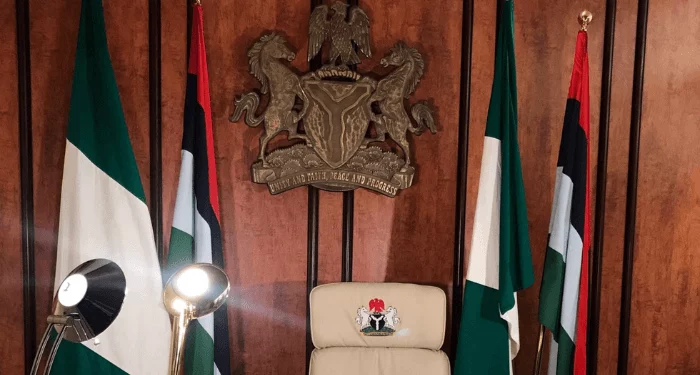Nigeria’s next president to contend with revenue disaster
As the main contenders for Nigeria’s top job emerge ahead of elections next February, whoever does get the nod to be president has the puzzle of a strained public purse to solve if he must avert a brutal financial crisis in the country of 200 million people.
Nigeria can barely cover its expenses with the abysmally low cash it generates, forcing the government to borrow more than it can comfortably repay. But the situation could get much worse.
In the next president’s third year in office, Nigeria will probably spend 100 percent of its revenues repaying creditors. That’s according to the International Monetary Fund (IMF), which predicts Nigeria’s debt service as a percentage of revenues to hit 100 percent by 2026 if the country does nothing to generate more cash.
Fresh data from the Central Bank of Nigeria (CBN) providing insight into the country’s financial accounts for the first month of 2022 made two things clear. First is the Federal Government’s revenues have continued to underperform the budget and second is a widening budget deficit, which implies that more money will have to be borrowed to fully implement the budget.
The CBN data showed that the Federal Government’s retained revenue in January 2022 amounted to N406 billion, 39 percent below the pro-rata monthly budget benchmark of N666 billion.
The lower-than-planned revenue makes the fact that January’s revenue jumped 34 percent compared to the same period last year and 14 percent compared to December 2021 easy to brush aside.
When annualised, January’s run rate suggests that the government could end up with less than half of the N10.7 trillion revenue projected in the 2022 budget, leaving a gaping hole to be filled.
It also means that the government may spend even more than it will earn this year on a controversial petrol subsidy, which is now tipped by the IMF to gulp N6 trillion on account of rising oil prices. The government made provision for N4 trillion in the budget, a quarter of total expenditure.
“One thing that is clear to any discerning person is that the next president must find a way to increase revenues and cut out wasteful spending like the petrol subsidy,” Taiwo Oyedele, an economist, who is also a partner and head of tax and regulatory services at PWC Nigeria, said.
“Our budgeting process needs an urgent review to bridge the recurring gap between actual revenue and what is budgeted,” Oyedele said.
Although key revenue items outperformed relative to the benchmark, with revenue from the federation account, and VAT increasing by 34 percent and 18 percent, compared to last year, to reach N249 billion and N28 billion respectively, even as independent revenue also expanded by 155 percent to N126 billion, the government’s other revenue sources, such as special levies and special accounts, came in at nil, compared with a pro-rata benchmark of N231 billion.
It won’t be the first time the government has earned less cash than it projected. It has been the case for six straight years now, resulting in reduced spending on capital projects and creating a wider budget deficit that has been mainly financed by borrowing.
The government’s strained public purse is why critics of the petrol subsidy practice query its very existence.
“A government with such a huge deficit every year has no business with such frivolous spending; it simply makes no sense,” Egie Akpata, chairman at Lagos-based financial advisory firm, Skymark Partners Ltd, said referring to the petrol subsidy practice.
“The wide disparity between actual revenues and the budget has been there for years and makes a mockery of our economic planning,” he said.
Whenever revenues don’t match the budget projection, the government invests less in critical capital projects and that was the case yet again in January.
Capital expenditure fell 30 percent in January compared to the same period last year, accounting for 29.7 percent of total expenditure. Recurrent expenditure, which dominated total spending at 65.9 percent, increased by 2.4 percent in the period.
Total expenditure amounted to N951 billion, compared to last year and 16 percent lower than the monthly expenditure target.
The mismatch between revenues and expenditure left the government with a deficit of N545.6 billion in the month, 16 percent higher than the target set in the budget. It however represented a marked decline from the N1.1 trillion recorded in the same period last year, when the expenditure outlay of ministries and government agencies jumped following the rollover and release of outstanding (capital) allocations to ministries, departments and agencies in the 2020 budget. Revenue shortfalls, particularly from non-oil sources, due to the lingering effect of the pandemic also contributed.
Nigeria spends the bulk of its money on recurrent expenditure from worker salaries to interest payments on debt.
Development economists have long argued that developing countries like Nigeria should spend more on capital projects in order to bridge a severe infrastructure deficit that constrains businesses and economic growth.
For Nigeria, the Africa Development Bank estimates that an annual investment of $100 billion for the next 30 years is required to address its infrastructure deficit. That’s more than three times the Federal Government’s annual budget and has formed the basis for why analysts prescribe a public private partnership as the most realistic way to address the deficit.
“It is why the next president must seek better ways to collaborate with the private sector,” said Muda Yusuf, CEO of the Centre for Promotion of Private Enterprise. “Our future as a country depends on what we begin to do now to avert a financial meltdown.”
The government collects only 6 percent of GDP in revenues yearly, less than half of what governments in frontier markets collect (15 percent), according to World Bank data.








